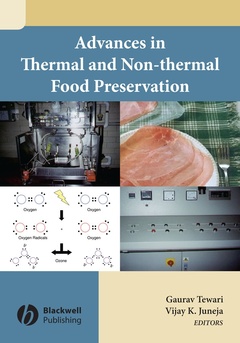Description
Advances in thermal & non-thermal food preservation
Authors: TEWARI Gaurav, JUNEJA Vijay K.
Language: English
Subjects for Advances in thermal & non-thermal food preservation:
Approximative price 192.07 €
Subject to availability at the publisher.
Add to cart
Publication date: 03-2007
288 p. · 18x25 cm · Hardback
288 p. · 18x25 cm · Hardback
Description
/li>Contents
/li>Readership
/li>
Advances in Thermal and Non-Thermal Food Preservation provides current, definitive and factual material written by experts on different thermal and non-thermal food preservation technologies. Emphasizing inactivation of microorganisms through the application of traditional as well as newer and novel techniques and their combinations, the book's chapters cover: thermal food preservation techniques (e.g., retorting, UHT and aseptic processing), minimal thermal processing (e.g., sous-vide processing), and non-thermal food preservation techniques (e.g., high pressure processing and pulsed technologies). Editors Tewari and Juneja give special emphasis to the commercial aspects of non-conventional food preservation techniques. As the most comprehensive and contemporary resource of its kind, Advances in Thermal and Non-Thermal Food Preservation is the definitive standard in describing the inactivation of microorganisms through conventional and newer, more novel techniques.
1. Basic food microbiology. 2. Thermal processing of liquid foods with or without particulates. 3. Aseptic processing. 4. UHT and aseptic processing of milk and milk products. 5. Microwave and radiofrequency heating. 6. Novel thermal processing technologies. 7. Sous vide and cook-chill processing of foods: concept development and microbiological safety. 8. Radio frequency heating: commercial developments. 9. Active packaging: a non-thermal process. 10. The ozonation concept: advantages of ozone treatment and commercial developments. 11. Electronic Pasteurization. 12. High pressure processing of foods. 13. Pulsed electric field technology: effect on milk and fruit juices. Index.
Food safety and microbiology professionals, university researchers, professors, students, industrial scientists, regulatory scientists, food inspectors, processing and sanitation personnel
© 2024 LAVOISIER S.A.S.

